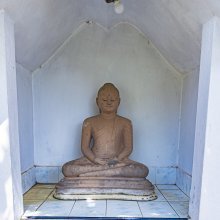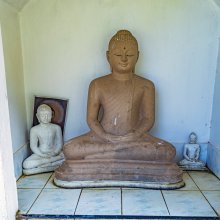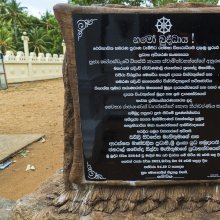Nishanta, Niśānta, Nisha-anta, Nisamta, Nishamta: 14 definitions
Introduction:
Nishanta means something in Hinduism, Sanskrit, Marathi, Jainism, Prakrit. If you want to know the exact meaning, history, etymology or English translation of this term then check out the descriptions on this page. Add your comment or reference to a book if you want to contribute to this summary article.
The Sanskrit term Niśānta can be transliterated into English as Nisanta or Nishanta, using the IAST transliteration scheme (?).
Images (photo gallery)
In Hinduism
Vaishnavism (Vaishava dharma)
Source: Pure Bhakti: Bhajana-rahasya - 2nd EditionNiśānta (निशान्त) refers to:—The end of the night just prior to dawn. (cf. Glossary page from Bhajana-Rahasya).

Vaishnava (वैष्णव, vaiṣṇava) or vaishnavism (vaiṣṇavism) represents a tradition of Hinduism worshipping Vishnu as the supreme Lord. Similar to the Shaktism and Shaivism traditions, Vaishnavism also developed as an individual movement, famous for its exposition of the dashavatara (‘ten avatars of Vishnu’).
Shaktism (Shakta philosophy)
Source: Google Books: ManthanabhairavatantramNiśānta (निशान्त) refers to one of the eight Guardians (kṣetrapāla-aṣṭaka) associated with Candrapīṭha (or Candrapīṭhapura), according to the Manthānabhairavatantra, a vast sprawling work that belongs to a corpus of Tantric texts concerned with the worship of the goddess Kubjikā.—[...] The eight Guardians (kṣetrapālāṣṭaka): Niśānta, Nigraha, Dhanañjaya, Dhaneśvara, Karāla, Vaḍavāmukha, Vikarāla, Sugrīva.

Shakta (शाक्त, śākta) or Shaktism (śāktism) represents a tradition of Hinduism where the Goddess (Devi) is revered and worshipped. Shakta literature includes a range of scriptures, including various Agamas and Tantras, although its roots may be traced back to the Vedas.
Languages of India and abroad
Marathi-English dictionary
Source: DDSA: The Molesworth Marathi and English Dictionaryniśānta (निशांत).—m (S Poetry.) Termination or close of the night. Ex. niśāntīṃ ugavē caṇḍakiraṇa ||.
Marathi is an Indo-European language having over 70 million native speakers people in (predominantly) Maharashtra India. Marathi, like many other Indo-Aryan languages, evolved from early forms of Prakrit, which itself is a subset of Sanskrit, one of the most ancient languages of the world.
Sanskrit dictionary
Source: DDSA: The practical Sanskrit-English dictionaryNiśānta (निशान्त).—p. p.
1) Tranquil, calmed, quiet, patient.
2) Customary, traditional.
-tam 1 A house, habitation, dwelling; तस्याः स राजोपपदं निशान्तं कामीव कान्ताहृदयं विवेश (tasyāḥ sa rājopapadaṃ niśāntaṃ kāmīva kāntāhṛdayaṃ viveśa) R.16.4.
3) A harem, seraglio; Kau. A.1.
--- OR ---
Niśānta (निशान्त).—
1) the passing away of night.
2) daybreak; ये मां स्तुवन्त्यनेनाङ्ग प्रतिबुध्य निशात्यये (ye māṃ stuvantyanenāṅga pratibudhya niśātyaye) Bhāgavata 8.4.25.
Derivable forms: niśāntaḥ (निशान्तः).
Niśānta is a Sanskrit compound consisting of the terms niśā and anta (अन्त). See also (synonyms): niśātikrama, niśātyaya, niśāvasāna.
Source: Cologne Digital Sanskrit Dictionaries: Shabda-Sagara Sanskrit-English DictionaryNiśānta (निशान्त).—mfn.
(-ntaḥ-ntā-ntaṃ) Quiet, tranquil, patient. n.
(-ntaṃ) 1. A house, a dwelling. 2. The end of the night, or break of day. E. ni before, śam to be quiet, aff. kta; or niśā night, am to go, aff. kta; or niśā as before night, and anta end or term.
Source: Cologne Digital Sanskrit Dictionaries: Cappeller Sanskrit-English DictionaryNiśānta (निशान्त).—1. [adjective] tested, approved, usual, customary.
--- OR ---
Niśānta (निशान्त).—2. [neuter] dwelling-place, house.
--- OR ---
Niśānta (निशान्त).—3. [substantive] close of night, day-break.
Source: Cologne Digital Sanskrit Dictionaries: Monier-Williams Sanskrit-English Dictionary1) Niśānta (निशान्त):—[from niśā > niś] 1. niśānta (śānta) m. or n. ‘n°-close’, daybreak, [Manu-smṛti iv, 99.]
2) [=ni-śānta] [from ni-śam] 2. ni-śānta mfn. allayed, tranquil, calm, [cf. Lexicographers, esp. such as amarasiṃha, halāyudha, hemacandra, etc.]
3) [v.s. ...] customary, traditional, [Āśvalāyana-śrauta-sūtra] (cf. yathā-n)
4) [v.s. ...] n. a house, dwelling, habitation, [Kāvya literature]
5) [v.s. ...] a harem, seraglio, [Dharmaśarmābhyudaya]
Source: Cologne Digital Sanskrit Dictionaries: Yates Sanskrit-English DictionaryNiśānta (निशान्त):—[niśā+nta] (ntaḥ-ntā-ntaṃ) a. Quiet, tranquil. n. A house; break of day.
Source: DDSA: Paia-sadda-mahannavo; a comprehensive Prakrit Hindi dictionary (S)Niśānta (निशान्त) in the Sanskrit language is related to the Prakrit word: Ṇisaṃta.
[Sanskrit to German]
Sanskrit, also spelled संस्कृतम् (saṃskṛtam), is an ancient language of India commonly seen as the grandmother of the Indo-European language family (even English!). Closely allied with Prakrit and Pali, Sanskrit is more exhaustive in both grammar and terms and has the most extensive collection of literature in the world, greatly surpassing its sister-languages Greek and Latin.
Prakrit-English dictionary
Source: DDSA: Paia-sadda-mahannavo; a comprehensive Prakrit Hindi dictionaryṆisaṃta (णिसंत) in the Prakrit language is related to the Sanskrit word: Niśānta.
Prakrit is an ancient language closely associated with both Pali and Sanskrit. Jain literature is often composed in this language or sub-dialects, such as the Agamas and their commentaries which are written in Ardhamagadhi and Maharashtri Prakrit. The earliest extant texts can be dated to as early as the 4th century BCE although core portions might be older.
Kannada-English dictionary
Source: Alar: Kannada-English corpusNiśāṃta (ನಿಶಾಂತ):—[adjective] still; calm; quiet.
--- OR ---
Niśāṃta (ನಿಶಾಂತ):—
1) [noun] the place in which a person resides; a house; residence.
2) [noun] the last part of night.
Kannada is a Dravidian language (as opposed to the Indo-European language family) mainly spoken in the southwestern region of India.
Nepali dictionary
Source: unoes: Nepali-English DictionaryNiśānta (निशान्त):—n. night just before dawn; fourth part of night;
Nepali is the primary language of the Nepalese people counting almost 20 million native speakers. The country of Nepal is situated in the Himalaya mountain range to the north of India.
See also (Relevant definitions)
Partial matches: Santa, Nish, Nica, Ni, Anta.
Starts with: Nishamtavirakta, Nishantanari, Nishantanarivriksha, Nishantayu.
Ends with: Anishanta, Sunisamta.
Full-text (+1): Nishantanari, Nishantiya, Nishantanarivriksha, Nishantodyana, Anishanta, Yathanishantam, Upapada, Nishavasana, Nishatikrama, Nishatyaya, Sugriva, Vikarala, Vadavamukha, Dhananjaya, Dhaneshvara, Ashtakaliya-lila, Nigraha, Svanta, Sam, Karala.
Relevant text
Search found 6 books and stories containing Nishanta, Ni-śānta, Ni-santa, Ni-shanta, Niśā-anta, Nisa-anta, Nisamta, Ṇisaṃta, Niśāṃta, Niśānta, Nisanta, Ṇisanta, Niśanta, Nisha-anta, Nishamta; (plurals include: Nishantas, śāntas, santas, shantas, antas, Nisamtas, Ṇisaṃtas, Niśāṃtas, Niśāntas, Nisantas, Ṇisantas, Niśantas, Nishamtas). You can also click to the full overview containing English textual excerpts. Below are direct links for the most relevant articles:
Bhakti-rasamrta-sindhu (by Śrīla Rūpa Gosvāmī)
Verse 2.3.10 < [Part 3 - Involuntary Ecstatic Expressions (sattvika-bhāva)]
Verse 3.3.27 < [Part 3 - Fraternal Devotion (sakhya-rasa)]
Verse 2.1.135 < [Part 1 - Ecstatic Excitants (vibhāva)]
Bhajana-Rahasya (by Srila Bhaktivinoda Thakura Mahasaya)
Chapter 1 - Prathama-yāma-sādhana (Niśānta-bhajana–śraddhā)
Text 38 < [Chapter 1 - Prathama-yāma-sādhana (Niśānta-bhajana–śraddhā)]
Text 44 < [Chapter 2 - Dvitīya-yāma-sādhana (Prātaḥ-kālīya-bhajana)]
Satapatha-brahmana (by Julius Eggeling)
Kāṇḍa XIII, adhyāya 4, brāhmaṇa 3 < [Thirteenth Kāṇḍa]
Srila Gurudeva (The Supreme Treasure) (by Swami Bhaktivedanta Madhava Maharaja)
Life before joining the Maṭha < [Chapter 1.2 - Śrīla Gurudeva’s Pūrvāśrama]
The backdrop of the Srikanthacarita and the Mankhakosa (by Dhrubajit Sarma)
Part 7 - Comparison [of the Maṅkhakośa] with other koṣas < [Chapter V - The Maṅkhakośa]


